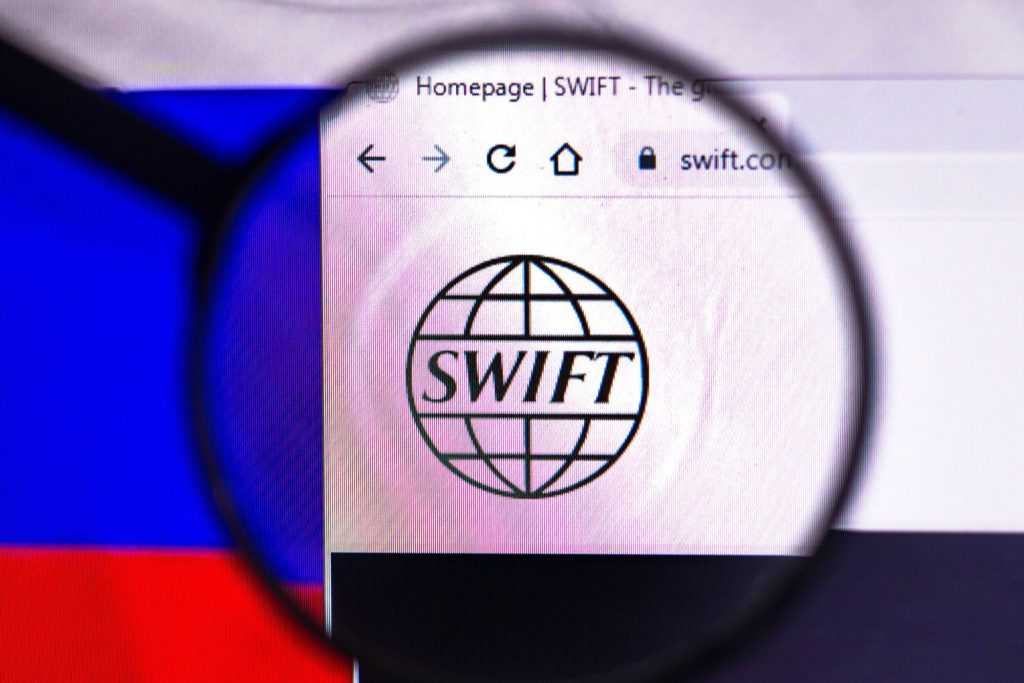(Bloomberg) — The European Union is getting closer to supporting the expulsion of Russia from the SWIFT financial messaging system over the invasion of Ukraine, with Germany throwing its weight behind the move.
“We are working flat out on how to limit the collateral damage of decoupling from SWIFT in such a way that it affects the right people,” German Foreign Minister Annalena Baerbock and Vice Chancellor Robert Habeck said in a statement on Saturday. “What we need is a targeted and functional restriction of SWIFT.”
The European Central Bank and the European Commission are assessing the impact such a move will have on the domestic economy to allow member states to make a decision on the measure. Blocking Moscow from the system would require unanimity among the 27 EU countries, but Germany had been putting up the biggest opposition.
EU foreign ministers will hold a virtual meeting on Sunday “to adopt further measures” in support of Ukraine and against Russia’s “aggression,” Josep Borrell, the EU’s top foreign-policy representative, said on Twitter.
The EU’s first two sanctions packages did little to deter Russian President Vladimir Putin from continuing his aggressive actions against Ukraine, leading the bloc to start work on a third package that may include the SWIFT provision, according to an official familiar with the plans. Opposition to the move has been decreasing, with France and Italy also publicly expressing support.
Borrell said he’ll also propose “a package of emergency assistance for the Ukrainian armed forces” at Sunday’s meeting.
In a telephone call on Saturday, Italian Prime Minister Mario Draghi told Ukrainian President Volodymyr Zelenskiy that he fully supports the EU’s line on sanctions, “including those within the SWIFT framework,” according to a statement from Draghi’s office. Separately, Lithuanian Prime Minister Ingrida Simonyte said, “from what I’m hearing, it seems there’s no longer any strong opposition” to the proposal.
SWIFT, which delivers secure messages among more than 11,000 financial institutions and companies, is central to the global financial system and an inability to access it could cause significant economic damage.
‘Nuclear Option’
French Finance Minister Bruno Le Maire told reporters on Friday that France didn’t have reservations about blocking Russia from SWIFT, adding that it would be a “financial nuclear option.”
“Now of course when you do have a financial nuclear weapon in your hands you do think carefully before using it,” he said.
Earlier, Germany had voiced reservations about the measure and underscored the severe implications, including the possibility that it would put deliveries of Russian gas at risk. Russia’s state-run energy giant Gazprom PJSC supplies about a third of all gas consumed in Europe. There are also concerns Russia could retaliate with harsh countermeasures.
Chancellor Olaf Scholz has called a special session of the German parliament on Sunday, where he is set to give a speech outlining his government’s response to Russia’s invasion of Ukraine. Germany announced plans on Saturday allow the Netherlands to send 400 anti-tank missiles to Ukraine and said it will consider further assistance.
Polish Prime Minister Mateusz Morawiecki, joined by Lithuanian President Gitanas Nauseda, traveled to Berlin on Saturday to meet with Scholz and to push for Russia’s exclusion from SWIFT. Morawiecki’s spokesman, Piotr Muller, told Bloomberg that “the last 24 hours has seen a shift in attitudes in a number of previously skeptical governments” on the issue.
U.S. Considers Block
Hungary also said on Saturday it wouldn’t block any sanctions proposal from the EU, according to Foreign Minister Peter Szijjarto.
The move comes as the U.S. is seriously considering whether to block Russia from SWIFT, with officials discussing the matter with the Federal Reserve, which sits on the messaging system’s oversight body, according to people familiar with the matter. Another person said talks have commenced with the EU Commission, the bloc’s executive authority.
The U.K., which was one of the first major western allies to come out in support of the measure, has been pushing hard to get others on board, according to people familiar with the matter and documents seen by Bloomberg.
SWIFT, which stands for the Society for Worldwide Interbank Financial Telecommunication, is overseen by the National Bank of Belgium and central bank representatives from the U.S., U.K., EU, Japan, Russia, China and others. It delivers secure messages among more than 11,000 financial institutions and companies, in over 200 countries and territories.
‘Far-Reaching Implications’
The U.S., several EU member states and the commission are increasingly trying to dispel concerns about the impact that a SWIFT block would have on the EU’s huge trade links with Russia and on energy payments, according to other officials, who asked not to be identified because the talks are private.
Some of the EU’s top officials also back the measure and believe it needs to happen soon because the impact of sanctions introduced so far will take time to materialize, the people said.
“Given the potentially far-reaching implications of cutting off Russia from SWIFT of course this option has to be presented to member states also with an assessment on the exact implications,” the EU’s economy chief, Valdis Dombrovskis, told reporters in Paris on Friday. “But it’s clear that all options are on the table including SWIFT.”
(Updates with EU foreign ministers to meet Sunday in fourth paragraph.)
More stories like this are available on bloomberg.com
©2022 Bloomberg L.P.











